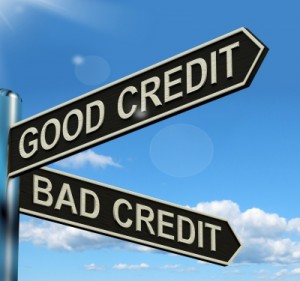Poor Credit History or Rating-
A negative credit rating on the part of a borrower is considered by lenders to indicate a higher risk. Therefore some lenders will not loan to borrowers with a poor credit rating, while others may actually specialize in borrowers with poor credit but charge higher rates to compensate for the increased risk of lending.
“Poor credit” is also called adverse credit history, sub-prime credit history, non-status credit history, impaired credit history, and bad credit history, but all refer to a negative credit rating.
Effects of a Poor Credit Rating
Interest rates on loans are significantly affected by credit history; the higher the credit rating, lower the interest rates charged, while the lower the credit rating, the higher the interest rate charged. The increased interest is used to offset the higher rate of default within the low credit rating group of individuals. Thus maintaining a good credit rating will save you tens of thousands if not hundreds of thousands over your lifetime.
In the United States insurance, housing, and employment can be denied based on a negative credit rating. Almost everything we do involves our credit rating, when a customer fills out an application for credit from a bank, store or credit card company, their information is forwarded to a credit bureau. Even applying for a job may involve a credit check. The credit bureau matches your name, address and other identifying information with information retained in its files. A consumer’s credit history is compiled by the consumer reporting agencies or credit bureaus. The data recorded by these agencies are primarily provided to them by creditors and includes detailed records of the relationship a person has with the lender. Detailed account information, including payment history, credit limits, high and low balances, and any aggressive actions taken to recover overdue debts, are all reported regularly (usually monthly). This information is reviewed by a potential lender to determine whether to approve a loan and on what terms.
Credit Scores
attempt to assess how likely it is that a particular borrower will repay a loan or other credit obligation. The higher the score, the better the credit history and the higher the probability that the loan will be repaid on time. When creditors report an excessive number of late payments, or trouble with collecting payments, your credit score suffers. If adverse judgments or collection agency activity are reported, the credit score decreases as well. Repeated delinquencies or public record entries can lower the score and trigger what is called a negative credit rating or adverse credit history.
Note that it is not the credit reporting agencies themselves that decide whether a credit history is “adverse” or not. Each individual lender makes their own decision based on their own criteria of what scores fall within their guidelines. Lender’s specific guidelines are generally NOT disclosed to the applicant due to competitive reasons. In the United States, a creditor is required to give the reasons for denying credit to an applicant immediately and must also provide the name and address of the credit reporting agency who provided data that was used to make the decision.
Credit History
Your credit history is used by lenders to determine your ability and track record of repaying debts. The willingness to repay a debt is indicated by how timely past payments have been made to other lenders. Lenders like to see consumer debt obligations paid regularly and on time, and therefore focus particularly on missed payments and may not, for example, consider an overpayment as an offset for a missed payment. See: How to Calculate Your Credit Score for more information on how credit scores are calculated.
If a US consumer disputes some information in a credit report, the credit bureau has 30 days to verify the data. Over 70 percent of these consumer disputes are resolved within 14 days and then the consumer is notified of the resolution.
Income
Income is another factor in determining whether a lender will provide a consumer credit or a loan. Theoretically, the higher your income the more credit you can access. However, lenders also take into consideration your current level of debt and make credit granting decisions based on both ability to repay a debt (income) and your willingness to repay as indicated by a history of regular, prompt payments.
See Also:
- Five Activities That Can Ruin Your Credit Score
- Tips to Rebuild Good Credit and Your Financial Independence
- How to Start Your Credit History
- How to Hurt Your Credit Score
- When is Filing Bankruptcy Necessary?
- Credit Cards That Pay You Cash
- Which Type of Loan is Best?
- Getting Out Of The Debt Trap
This article uses material from the Wikipedia article bad credit, which is released under the Creative Commons Attribution-Share-Alike License 3.0.
Image courtesy of Stuart Miles / FreeDigitalPhotos.net

